- Help & FAQ

Plural policing in England and Wales: thoughts and discussion
- Criminology, Policing and Security Research and Innovation Group
Research output : Contribution to journal › Comment/debate › peer-review
| Original language | English |
|---|---|
| Article number | 00235 |
| Number of pages | 5 |
| Journal | |
| Volume | 6 |
| Issue number | 5 |
| Publication status | Published - 19 Nov 2018 |
- plural policing
- non-public sector policing provision
- England and Wales
- networked policing
- accountability
Access to Document
- FRCIJ-06-00235 Final published version, 478 KB Licence: CC BY-NC
- https://medcraveonline.com/FRCIJ/FRCIJ-06-00235.pdf Licence: CC BY-NC
Fingerprint
- police Social Sciences 100%
- social system Social Sciences 32%
- public sector Social Sciences 27%
- legitimacy Social Sciences 26%
- present Social Sciences 18%
- responsibility Social Sciences 18%
- trend Social Sciences 16%
T1 - Plural policing in England and Wales
T2 - thoughts and discussion
AU - Rogers, Colin
PY - 2018/11/19
Y1 - 2018/11/19
N2 - Plural policing can be described as a new way of looking at policing which may now have moved away from a police-centric view of the world, and includes a new way of viewing the social system that surrounds policing itself. In particular this involvesthe growth of the non -public sector policing provision of policing activities. When discussing exactly what is meant by policing, there has been a focus on discussing the topic purely from the view of the uniform services provided by the public policeorganisation. However, there is a need to move away from the idea that ‘policing’ is associated purely with the work of the uniformed public police alone. This is an important point that needs to be reinforced, but to understand the current and ongoing trend for plural policing we need to situate the present state (and future) of police activity. This article discusses the concept of plural policing and also considers examples from different countries in order to appreciate such important facets as police accountability and legitimacy within the democratic policing model.
AB - Plural policing can be described as a new way of looking at policing which may now have moved away from a police-centric view of the world, and includes a new way of viewing the social system that surrounds policing itself. In particular this involvesthe growth of the non -public sector policing provision of policing activities. When discussing exactly what is meant by policing, there has been a focus on discussing the topic purely from the view of the uniform services provided by the public policeorganisation. However, there is a need to move away from the idea that ‘policing’ is associated purely with the work of the uniformed public police alone. This is an important point that needs to be reinforced, but to understand the current and ongoing trend for plural policing we need to situate the present state (and future) of police activity. This article discusses the concept of plural policing and also considers examples from different countries in order to appreciate such important facets as police accountability and legitimacy within the democratic policing model.
KW - plural policing
KW - non-public sector policing provision
KW - England and Wales
KW - networked policing
KW - accountability
M3 - Comment/debate
SN - 2469-2794
JO - Forensic Research & Criminology International Journal
JF - Forensic Research & Criminology International Journal
- Search Menu
Sign in through your institution
- Advance articles
- Featured Content
- Author Guidelines
- Open Access
- About The British Journal of Criminology
- About the Centre for Crime and Justice Studies
- Editorial Board
- Advertising and Corporate Services
- Journals Career Network
- Self-Archiving Policy
- Dispatch Dates
- Terms and Conditions
- Journals on Oxford Academic
- Books on Oxford Academic

- < Previous
Examining the how of Plural Policing: Moving from Normative Debate to Empirical Enquiry
- Article contents
- Figures & tables
- Supplementary Data
Martin Nøkleberg, Examining the how of Plural Policing: Moving from Normative Debate to Empirical Enquiry, The British Journal of Criminology , Volume 60, Issue 3, May 2020, Pages 681–702, https://doi.org/10.1093/bjc/azz080
- Permissions Icon Permissions
The networked and plural nature of policing suggests that agencies are often involved in extensive exchanges of expertise, resources and knowledge. However, the network structure and distribution of power between various policing actors can vary considerably. This highlights the importance of developing sound analytical perspectives that can help unpack the complexities behind the linkages. Applying the network perspective, this article underlines the value of utilizing analytical tools and approaches drawn from social network analysis, such as brokerage and homophily, to empirically assess the roles of agencies and their contribution to plural policing. This, in turn, shows how, in the mixed economy of policing, as well as being understood in terms of the normative debates that often figure in the current literature, relational phenomena also require more sophisticated empirical approaches.
Personal account
- Sign in with email/username & password
- Get email alerts
- Save searches
- Purchase content
- Activate your purchase/trial code
- Add your ORCID iD
Institutional access
Sign in with a library card.
- Sign in with username/password
- Recommend to your librarian
- Institutional account management
- Get help with access
Access to content on Oxford Academic is often provided through institutional subscriptions and purchases. If you are a member of an institution with an active account, you may be able to access content in one of the following ways:
IP based access
Typically, access is provided across an institutional network to a range of IP addresses. This authentication occurs automatically, and it is not possible to sign out of an IP authenticated account.
Choose this option to get remote access when outside your institution. Shibboleth/Open Athens technology is used to provide single sign-on between your institution’s website and Oxford Academic.
- Click Sign in through your institution.
- Select your institution from the list provided, which will take you to your institution's website to sign in.
- When on the institution site, please use the credentials provided by your institution. Do not use an Oxford Academic personal account.
- Following successful sign in, you will be returned to Oxford Academic.
If your institution is not listed or you cannot sign in to your institution’s website, please contact your librarian or administrator.
Enter your library card number to sign in. If you cannot sign in, please contact your librarian.
Society Members
Society member access to a journal is achieved in one of the following ways:
Sign in through society site
Many societies offer single sign-on between the society website and Oxford Academic. If you see ‘Sign in through society site’ in the sign in pane within a journal:
- Click Sign in through society site.
- When on the society site, please use the credentials provided by that society. Do not use an Oxford Academic personal account.
If you do not have a society account or have forgotten your username or password, please contact your society.
Sign in using a personal account
Some societies use Oxford Academic personal accounts to provide access to their members. See below.
A personal account can be used to get email alerts, save searches, purchase content, and activate subscriptions.
Some societies use Oxford Academic personal accounts to provide access to their members.
Viewing your signed in accounts
Click the account icon in the top right to:
- View your signed in personal account and access account management features.
- View the institutional accounts that are providing access.
Signed in but can't access content
Oxford Academic is home to a wide variety of products. The institutional subscription may not cover the content that you are trying to access. If you believe you should have access to that content, please contact your librarian.
For librarians and administrators, your personal account also provides access to institutional account management. Here you will find options to view and activate subscriptions, manage institutional settings and access options, access usage statistics, and more.
Short-term Access
To purchase short-term access, please sign in to your personal account above.
Don't already have a personal account? Register
| Month: | Total Views: |
|---|---|
| January 2020 | 139 |
| February 2020 | 31 |
| March 2020 | 14 |
| April 2020 | 32 |
| May 2020 | 16 |
| June 2020 | 17 |
| July 2020 | 18 |
| August 2020 | 13 |
| September 2020 | 24 |
| October 2020 | 40 |
| November 2020 | 40 |
| December 2020 | 141 |
| January 2021 | 233 |
| February 2021 | 63 |
| March 2021 | 159 |
| April 2021 | 152 |
| May 2021 | 170 |
| June 2021 | 195 |
| July 2021 | 35 |
| August 2021 | 149 |
| September 2021 | 155 |
| October 2021 | 386 |
| November 2021 | 321 |
| December 2021 | 240 |
| January 2022 | 56 |
| February 2022 | 81 |
| March 2022 | 65 |
| April 2022 | 19 |
| May 2022 | 32 |
| June 2022 | 37 |
| July 2022 | 16 |
| August 2022 | 24 |
| September 2022 | 19 |
| October 2022 | 30 |
| November 2022 | 8 |
| December 2022 | 27 |
| January 2023 | 10 |
| February 2023 | 7 |
| March 2023 | 23 |
| April 2023 | 23 |
| May 2023 | 13 |
| June 2023 | 4 |
| July 2023 | 8 |
| August 2023 | 6 |
| September 2023 | 8 |
| October 2023 | 11 |
| November 2023 | 15 |
| December 2023 | 18 |
| January 2024 | 25 |
| February 2024 | 14 |
| March 2024 | 21 |
| April 2024 | 19 |
| May 2024 | 20 |
| June 2024 | 6 |
| July 2024 | 6 |
| August 2024 | 14 |
| September 2024 | 5 |
Email alerts
Citing articles via.
- Recommend to your Library
Affiliations
- Online ISSN 1464-3529
- Print ISSN 0007-0955
- Copyright © 2024 Centre for Crime and Justice Studies (formerly ISTD)
- About Oxford Academic
- Publish journals with us
- University press partners
- What we publish
- New features
- Open access
- Rights and permissions
- Accessibility
- Advertising
- Media enquiries
- Oxford University Press
- Oxford Languages
- University of Oxford
Oxford University Press is a department of the University of Oxford. It furthers the University's objective of excellence in research, scholarship, and education by publishing worldwide
- Copyright © 2024 Oxford University Press
- Cookie settings
- Cookie policy
- Privacy policy
- Legal notice
This Feature Is Available To Subscribers Only
Sign In or Create an Account
This PDF is available to Subscribers Only
For full access to this pdf, sign in to an existing account, or purchase an annual subscription.
To read this content please select one of the options below:
Please note you do not have access to teaching notes, plural policing: a state-of-the-art review.
Policing: An International Journal
ISSN : 1363-951X
Article publication date: 21 March 2016
The purpose of this paper is to report on the systematic review on the topic of plural policing. The authors aim to discuss the general characteristics of empirical research into plural policing and describe the way in which police literature deals with the questions related to plural policing.
Design/methodology/approach
A systematic review, including qualitative research, focused on empirical research results.
First of all, plural policing has been subject of study in a diversity of contexts, using multiple methods and treating very diverse research questions. Although the dangers of blurring boundaries between policing actors is a focal issue in contemplative papers, empirical research on plural policing does not focus on this issue but mentions it in the margins of the research results.
Research limitations/implications
Limitations are that the authors had to set a timeframe for the systematic review and that not all research was accessible. Furthermore, the authors had to limit the studies that could be included in this systematic review.
Social implications
One of the main research questions relates to the dangers of blurring boundaries between multiple policing actors. This has important implications for citizens in their relations and contacts with police actors (in terms of transparency, equality of rights and so on).
Originality/value
The paper gives a first insight into a domain that is written on extensively, but less empirically studied and sheds light on the studies that have taken the topic of plural policing as the focal point.
- Plural policing
- Blurring boundaries
Acknowledgements
The authors would like to thank FWO Vlaanderen for funding this research and Kaat Goossens for having carried out the literature search of publications in Dutch.
Boels, D. and Verhage, A. (2016), "Plural policing: a State-of-the-Art Review", Policing: An International Journal , Vol. 39 No. 1, pp. 2-18. https://doi.org/10.1108/PIJPSM-05-2015-0069
Emerald Group Publishing Limited
Copyright © 2016, Emerald Group Publishing Limited
Related articles
All feedback is valuable.
Please share your general feedback
Report an issue or find answers to frequently asked questions
Contact Customer Support
Plural Policing and the Abstract Police
- First Online: 23 January 2022
Cite this chapter

- Megan O’Neill 6
Part of the book series: Palgrave's Critical Policing Studies ((PCPS))
477 Accesses
Terpstra, Fyfe and Salet ( Police Journal: Theory, Practice and Principles, 92 (4), 339–359, 2019) introduced the concept of ‘the abstract police’ to explore how policing in many countries has become more distanced and formalised. What is missing from this analysis is the role of the private sector and other policing actors. This chapter will explore the ‘abstract police’ concept, describe some of the main features of pluralisation in policing and postulate what the outcome might be as these two systems interact. This chapter will argue that the role of neoliberalism has been overlooked, which may be an equally significant driver of change. It is through a consideration of pluralised policing that the importance of neoliberalism in the changes that the ‘abstract police’ are intended to identify becomes more apparent.
This is a preview of subscription content, log in via an institution to check access.
Access this chapter
Subscribe and save.
- Get 10 units per month
- Download Article/Chapter or eBook
- 1 Unit = 1 Article or 1 Chapter
- Cancel anytime
- Available as PDF
- Read on any device
- Instant download
- Own it forever
- Available as EPUB and PDF
- Durable hardcover edition
- Dispatched in 3 to 5 business days
- Free shipping worldwide - see info
Tax calculation will be finalised at checkout
Purchases are for personal use only
Institutional subscriptions
Similar content being viewed by others

Introduction to Policing in an Age of Reform
Policing in an age of reform—an overview of the united kingdom community-centred police model.

A Taxonomy of Plural Policing in the United States
Brown, D. M. (2017). Beyond the thin blue line? A critical analysis of Scotland’s Community Warden Scheme. Policing and Society, 27 (1), 6–20.
Article Google Scholar
Bullock, K., & Leeney, D. (2016). On matters of balance: An examination of the deployment, motivation and management of the special constabulary. Policing and Society, 26 (5), 483–502.
Bullock, K., & Millie, A. (Eds.). (2018). The special constabulary: Historical context, international comparisons and contemporary themes . Routledge.
Google Scholar
Button, M. (2019). Private policing (2nd ed.). Routledge.
Book Google Scholar
Button, M., Williamson, T., & Johnston, L. (2007). Too many chiefs, not enough chief executives: Barriers to the development of PFI in the police service in England and Wales. Criminology and Criminal Justice, 7 , 287–306.
de Maillard, J. (2005). The governance of safety in France. Theoretical Criminology, 9 (3), 325–343.
de Maillard, J., & Mouhanna, C. (2017). Governing metropolises: The false pretences of metropolisation. In E. Devroe, A. Edwards, & P. Ponsaers (Eds.), Policing European metropolises (pp. 77–94). Routledge.
Dickson, G. (2019). Bridging the gap? Police volunteering and community policing in Scotland. Policing: A Journal of Policy and Practice . https://doi.org/10.1093/police/paz070
Farkas, M. A., & Manning, P. K. (1997). The occupational culture of corrections and police officers. Journal of Crime and Justice, 20 (2), 51–68.
Fyfe, N. R., Terpstra, J., & Tops, P. (Eds.). (2013). Centralizing forces: Comparative perspectives on contemporary reforms to policing in northern and Western Europe . Eleven International Publishing.
Giddens, A. (1990). The consequences of modernity . Polity.
Giddens, A. (1991). Self-identity and modernity: Self and society in the late modern age . Polity.
Gill, M. (2013). Senior police officers’ perspectives on private security: Sceptics, pragmatists and embracers’. Policing and Society . https://doi.org/10.1080/10439463.2013.865736 . (Online First).
Greig-Midlane, J. (2014). Changing the beat? The impact of austerity on the neighbourhood policing workforce . UPSI.
Hauber, A., Hofstra, B., Toornvliet, L., & Zandbergen, A. (1996). Some new forms of functional social control in the Netherlands and their effects. British Journal of Criminology, 36 (2), 199–219.
Higgins, A. (2017). Neighbourhood policing: A police force typology . The Police Foundation. http://www.police-foundation.org.uk/2017/wp-content/uploads/2017/06/neighbourhood_policing_a_police__force_typology.pdf
Hofstra, B., & Shapland, J. (1997). Who is in control? Policing and Society, 6 (4), 265–281.
Huberts, L. W. J. C., Kaptein, M., & Lasthuizen, K. (2007). A study of the impact of three leadership styles on integrity violations committed by police officers. Policing: An International Journal, 30 (4), 587–607.
Ianni, E. R. (1983). Two cultures of policing: Street cops and management cops . Transaction Books.
Johnston, L., Button, M., & Williamson, T. (2008). Police, governance and the private finance initiative. Policing and Society, 18 , 225–244.
Loader, I. (1997). Private security and the demand for protection in contemporary Britain. Policing and Society, 7 , 143–162.
Loader, I., & Mulcahy, A. (2003). Policing and the condition of England: Memory, politics and culture . Oxford University Press.
Loader, I., & White, A. (2018). Valour for money? Contested commodification in the market for security. British Journal of Criminology, 58 , 1401–1419.
Malochet, V. (2007). Les policiers municipaux . PUF.
Mawby, R. C., Heath, G., & Walley, L. (2009). Workforce modernization, outsourcing and the “permanent revolution” in policing. Crime Prevention and Community Safety, 11 , 34–47.
O’Neill, M. (2010). The police response to crime. In S. G. Shoham, P. Knepper, & M. Kett (Eds.), The international handbook of criminology . CRC Press.
O’Neill, M. (2019). Police community support officers: Cultures and identities in pluralised policing (Clarendon series in criminology). University of Oxford Press.
Pepper, M., Bullock, K., & McCarthy, D. (2020). Exploring the role and contribution of police support volunteers in an English constabulary. Policing: A Journal of Policy and Practice . https://doi.org/10.1093/police/paaa005
Rawlings, P. (2008). Policing before the police. In T. Newburn (Ed.), Handbook of policing (2nd ed.). Willan Publishing.
Ritzer, G. (1993). The McDonaldization of society . Pine Forge Press.
Shearing, C., & Stenning, P. (1981). Modern private security: Its growth and implications. Crime and Justice, 3 , 193–245.
Shearing, C., & Stenning, P. (1983). Private security: Implications for social control. Social Problems, 30 , 493–506.
Shearing, C., & Wood, J. (2003). Nodal governance, democracy, and the new denizen. Journal of Law and Society, 30 (3), 400–419.
Singh, A.-M., & Light, M. (2019). Constraints on the growth of private policing: A comparative international analysis. Theoretical Criminology, 23 (3), 295–314.
Skinns, L. (2019). Police powers and citizens’ rights discretionary decision-making in police detention . Routledge.
Terpstra, J. (2017). ‘Not just one node among many’ – Plural policing in a state-dominated context: The case of Austria. Policing and Society, 27 (1), 68–68.
Terpstra, J., Fyfe, N. R., & Salet, R. (2019). The abstract police: A conceptual exploration of unintended changes of police organisations. Police Journal: Theory, Practice and Principles, 92 (4), 339–359.
Van Steden, R. (2017). ‘Municipal law enforcers: towards a new system of local policing in the Netherlands?’ Policing & Society, 27 (1), 40–53.
Van Steden, R., & Bron, E. (2012). Gemeentelijke handhavers in Amsterdam: een onderzoek naar hun werk op straat [Municipal law enforcers in Amsterdam: Depicting their work on the streets] . The Hague: Boom-Lemma.
Van Steden, R., & De Waard, J. (2013). ‘Acting like chameleons’: On the McDonaldization of private security. Security Journal, 26 (3), 294–309.
White, A. (2014). Post-crisis policing and public-private partnerships: The case of Lincolnshire police and G4S. British Journal of Criminology, 54 , 1002–1022.
Download references
Author information
Authors and affiliations.
School of Social Sciences, University of Dundee, Dundee, UK
Megan O’Neill
You can also search for this author in PubMed Google Scholar
Corresponding author
Correspondence to Megan O’Neill .
Editor information
Editors and affiliations.
Institute for International Research on Criminal Policy (IRCP), Department of Criminology, Criminal Law and Social Law, Faculty of Law & Criminology, Ghent University, Ghent, Belgium
Antoinette Verhage
Department of Public Governance and Management, Chair Research Group ‘Governing and Policing Security’ Ghent University, Ghent, Belgium
Marleen Easton
Research Group Crime and Society (CriS), Faculty of Law and Criminology, Department of Criminology, Vrije Universiteit Brussel (VUB), Brussel, Belgium
Sofie De Kimpe
Rights and permissions
Reprints and permissions

Copyright information
© 2022 The Author(s), under exclusive license to Springer Nature Switzerland AG
About this chapter
O’Neill, M. (2022). Plural Policing and the Abstract Police. In: Verhage, A., Easton, M., De Kimpe, S. (eds) Policing in Smart Societies. Palgrave's Critical Policing Studies. Palgrave Macmillan, Cham. https://doi.org/10.1007/978-3-030-83685-6_5
Download citation
DOI : https://doi.org/10.1007/978-3-030-83685-6_5
Published : 23 January 2022
Publisher Name : Palgrave Macmillan, Cham
Print ISBN : 978-3-030-83684-9
Online ISBN : 978-3-030-83685-6
eBook Packages : Law and Criminology Law and Criminology (R0)
Share this chapter
Anyone you share the following link with will be able to read this content:
Sorry, a shareable link is not currently available for this article.
Provided by the Springer Nature SharedIt content-sharing initiative
- Publish with us
Policies and ethics
- Find a journal
- Track your research

- CPS at Maklu-Online
- Panopticon Libri at Maklu-Online
Plural Policing in Comparative Perspective
Four models of regulation.
| authors | Jan Terpstra |
| Bas van Stokkom | |
| journal | EJPS (ISSN: 2034-760X) |
| volume | Volume 2 |
| issue | Issue 3: Plural Policing – Guest Editors: Jan Terpstra & Elke Devroe |
| section | Articles |
| date of publication | Feb. 10, 2015 |
| language | English |
| pagina | 325 |
| abstract | In this article the main findings and conclusions are presented of an international comparative study on the pluralization of policing in five countries (England and Wales, Canada, Belgium, Austria, and the Netherlands). We focus on the question: what are the main differences and similarities in plural policing between these countries, and how can these be understood? In answering this question much attention is given to the position of non-police providers of policing (employed by municipalities or security companies) in relation to the regular police. To understand the peculiarities of this pluralization we paid attention to legal, historical, cultural and political aspects, to the organization of the regular police and the position of private security. This study shows that the pluralization of policing has not been the result of some goal-intended governmental policy, but more an incremental process or the effect of an accumulation of unintended consequences. In the last section we present four models of regulation of plural policing that may be relevant to imagining potential future policy developments. |

- Transforming Society
- Open access
- Bristol University Press Digital

Sign up for 25% off all books
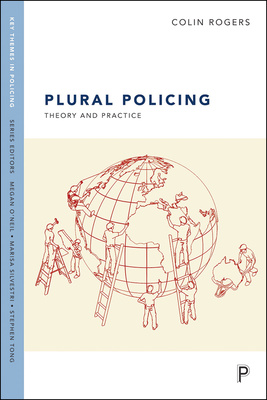
Plural Policing
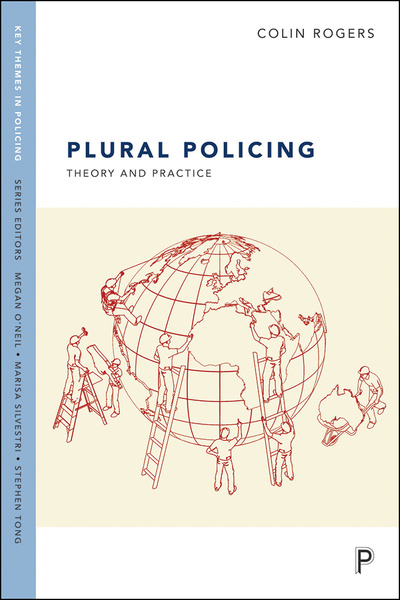
Theory and Practice
By colin rogers.
Browse the series
Recommend to library

Request e-inspection copy
- Description
The police increasingly need to work with other government agencies, the third sector, community organisations and the private sector, an approach known as “Plural Policing”. This book critically analyses the rise of this approach in England and Wales over the past decade, giving examples of national and international practice. Written by an author with experience in both practice and academia, it discusses the consequences of this approach for the historical model of policing provision and challenges views on how policing should be delivered in the future.
Part of Key themes in policing, a textbook series designed to fill a growing need for research-informed policing within Higher Education curriculums and in practice, edited by Megan O’Neill, Marisa Silvestri & Stephen Tong, this accessible text, aimed primarily at undergraduate students, will appeal widely across different modules and tie into important issues covered on all policing courses.
“A most welcome addition to the reading lists of students and practitioners in the wider policing field.” Sean Butcher, University of Leeds
Professor Colin Rogers is Professor of Police Sciences at the University of South Wales, where he is Head of Research and also responsible for developing postgraduate courses. Colin is a former police Inspector with South Wales Police with 30 years’ service. His areas of expertise include Community Safety Partnerships, Situational Crime Prevention, Problem Oriented Partnerships and also Police Governance and Accountability and he is editor of The Police Journal.
What is policing?;
Defining plural policing;
Private Policing;
Neighbourhood policing teams;
Community support Officers;
The rise of the volunteer;
Partnership or plural policing?;
Future directions.
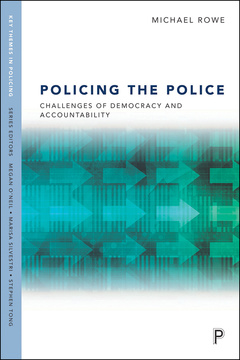
Policing the Police
By Michael Rowe
Find out more
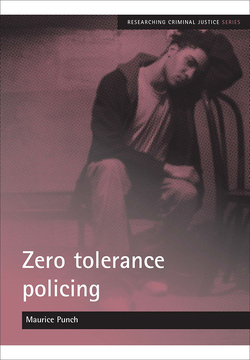
Zero tolerance policing
By Maurice Punch
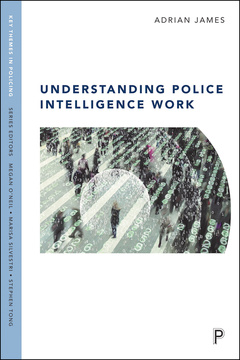
Understanding Police Intelligence Work
By Adrian James
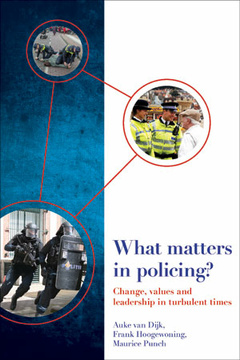
What Matters in Policing?
By Auke van Dijk , Frank Hoogewoning and Maurice Punch
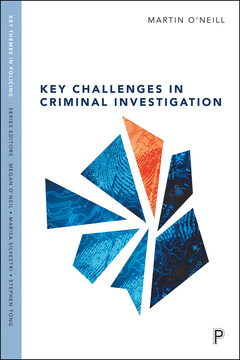
Key Challenges in Criminal Investigation
By Martin O'Neill
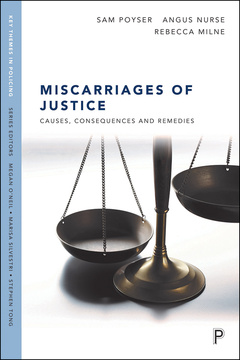
Miscarriages of Justice
By Sam Poyser , Angus Nurse and Rebecca Milne
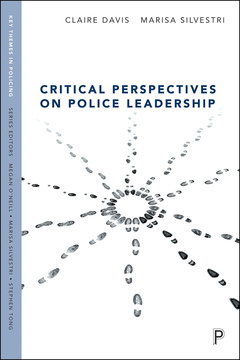
Critical Perspectives on Police Leadership
By Claire Davis and Marisa Silvestri
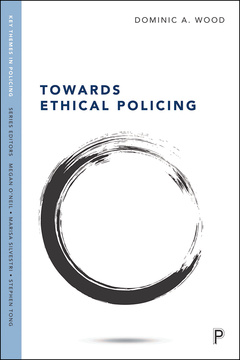
Towards Ethical Policing
By Dominic Wood
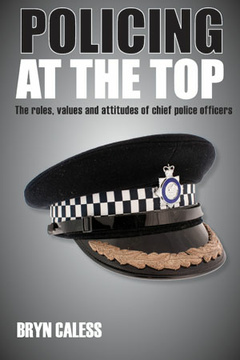
Policing at the top
By Bryn Caless
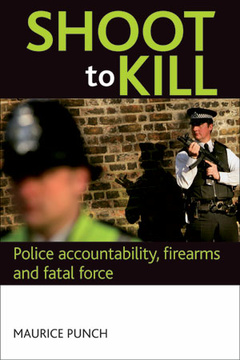
Shoot to kill
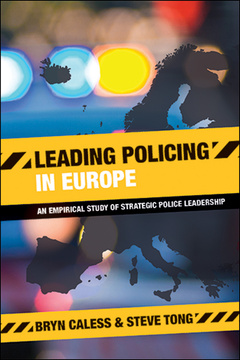
Leading Policing in Europe
By Bryn Caless and Steve Tong
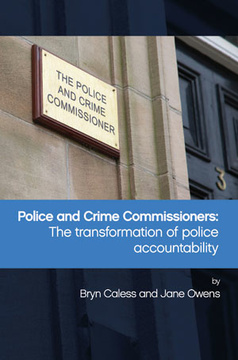
Police and Crime Commissioners
By Bryn Caless and Jane Owens
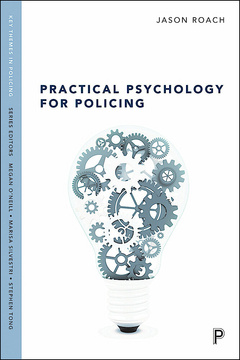
Practical Psychology for Policing
By Jason Roach
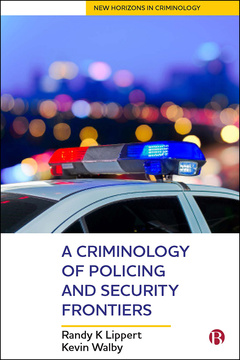
A Criminology of Policing and Security Frontiers
By Randy Lippert and Kevin Walby
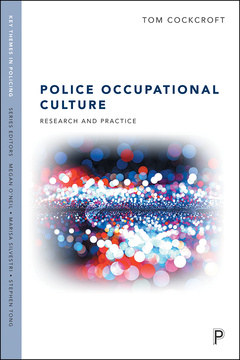
Police Occupational Culture
By Tom Cockcroft
Plural policing in england and wales: thoughts and discussion
- November 2018
- 6(5):397-401
- This person is not on ResearchGate, or hasn't claimed this research yet.
Discover the world's research
- 25+ million members
- 160+ million publication pages
- 2.3+ billion citations

- Philip Stenning

- Sarah Blackburn

- Bernhard Frevel

- David H. Bayley
- Les Johnston
- Egon Bittner
- Recruit researchers
- Join for free
- Login Email Tip: Most researchers use their institutional email address as their ResearchGate login Password Forgot password? Keep me logged in Log in or Continue with Google Welcome back! Please log in. Email · Hint Tip: Most researchers use their institutional email address as their ResearchGate login Password Forgot password? Keep me logged in Log in or Continue with Google No account? Sign up

leiden securityandglobalaffairs blog

Dr. Anna Matczak

Dr. Klaas Voss
Senior Lecturer

Dillon Ashmore
Research Assistant

Plural policing during health emergencies and natural disasters
January 14, 2021 • 4 min read
The presence of multiple providers of policing during an existential crisis can accelerate the pluralisation of policing and exacerbate trends of securitisation. How can multi-actor policing activities be managed in crisis situations to counterbalance this likely drift to excessive securitisation?
Plural and networked policing
One of many phenomena that the COVID-19 pandemic has cast a spotlight on is the nexus of policing and public health – more precisely, the use and the role of the multitude of security providers that have been involved in policing the pandemic. Beyond the conventional police, private security contractors, military and paramilitary personnel, municipal regulations officers, citizen initiatives and even PhD students have been given powers to enforce the pandemic policies and/or maintain the public order. Health agencies across the globe have expeditiously become the ally of police forces in regulating and enforcing anti-pandemic policies. In the criminological landscape, all this resonates with the expanding debate around the pluralisation of policing – the phenomenon which entails the increased significance of new competing state and non-state security providers to perform a wide range of policing functions in order to ensure public safety and security. This reconfiguration and diversification of traditional policing is best summarised by the Oxford criminologist Ian Loader:
“ Sure enough, this network continues to encompass the direct provision and supervision of policing by institutions of national and local government. But it now also extends – as we shall see – to private policing forms secured through government; to transnational police arrangements taking place above government; to markets in policing and security services unfolding beyond government; and to policing activities engaged in by citizens below government. We inhabit a world of plural, networked policing .” ( Loader, 2000: 324 )
Plural policing in health emergencies and natural disasters
Contemporary health emergencies and natural disasters provide a unique context to study plural policing. These type of crisis situations occur now in a highly globalized world with fragmented social structures and hybrid governance of relationships across multiple sectors and actors. As a result, public health emergencies and natural disasters create the urgent need to forge multi-agency alliances and force the state to share authority, legitimacy and capacity with other bodies. This, in consequence, might only accelerate the pluralisation of policing in the future.
In many regards, what the COVID-19 pandemic has revealed about the diversification of policing tasks is not entirely new, as similar observations were already documented, for instance, in relation to the recent West African Ebola epidemic (2014-2016) and security sector responses to the Brazilian Zika virus outbreak (2015-2016). The Ebola epidemic along with other public health emergencies informed the analysis of the crime and security researchers Julian Laufs and Zoha Waseem , who in their robust systematic review, attempt to showcase the best practices for policing the COVID-19 pandemic. The authors discuss four central themes that serve as a useful framework for studying the concept of policing during natural disasters and public health emergencies. These include (1) police-community relations (more specifically public trust and confidence in the police), (2) the psychological and mental well-being of police officers, (3) intra-organisational challenges (e.g. resource allocation, staffing issues, inadequate pre-disaster planning) and (4) inter-organisational collaboration and cooperation (e.g. between formal/informal, local/national/international stakeholders). The latter in particular sets the scene for the concept of plural policing and encourages to view the interplay of policing tasks during crises situations in both the vertical and the horizontal dimensions.
Where are we heading?
Public health and disaster emergencies will be an inseparable consequence of the accelerating global warming , which will inevitably bring more frequent large-scale crisis situations. On one hand, the phenomenon of plural policing during these types of emergencies can be seen as collective resilience based on a holistic and orchestrated response to the emergency, combined with efforts of a variety of actors to respond quickly and efficiently to additional demand for services and/or personnel. On the other hand, any multi-agency collaboration always exposes different organisational cultures, institutional traditions, professional standards, and degrees of accountability. Plural policing during health and natural disaster emergencies, without adequate regulatory framework, might heighten these divergencies and – as a final consequence – contribute to a gradual deconstruction of the Weberian state monopoly on the use of violence. Additionally, the complex hybrid governance of policing tasks, coupled with framing a health emergency as a security threat, can be very prone to an excessive securitisation of these processes. Especially with regard to infectious diseases, the academic debate about these problematic side effects has been a vibrant field of research for more than a decade (see Sara Davis, 2008 ). A similar constellation of securitisation processes has been observed and remarked upon in connection with the use of private security contractors, including Blackwater personnel, during natural disasters, such as Hurricane Katrina (2005) and the Haiti earthquake of 2010. Even a cursory review of the critical literature on what has negatively been described as neoliberal “disaster capitalism” ( Loretta Pyles et al., 2017 ) makes clear that this is not just a debate for crisis managers and policing experts, but an intensely ideological one as well. Less fundamental criticism will at the very least assert that the emergency responses, which are conditioned by the securitisation discourse, are at risk of introducing a bipolar social structure in which disproportionate coercive measures are implemented and societies might become more anxious, politically polarised and culturally fragile.
The variety of policing configurations during large-scale crisis situations might intentionally and unintentionally amplify existing securitisation trends. At the same time, this may cause political and academic critics of securitisation to lambast plural policing as the central culprit, without considering potential benefits of such practices in weak or fragile states or critical emergency situation. The proverbial baby may be dispensed with alongside the bathing water. The future challenge for practitioners, policymakers and scholars alike will be to balance the perils and opportunities that come with plural policing in existential crisis situations, which will be explored by the first author of this article during a scoping research project in the near future.
- plural policing
- securitization
- crisis management
- Paper Submission
- Testimonials
- Article Processing Charges
- Plural policing in england and wales thoughts and discussion
Submit manuscript...
Due to current covid19 situation and as a measure of abundant precaution, our member services centre are operating with minimum staff, eissn: 2469-2794, forensic research & criminology international journal.
Commentary Volume 6 Issue 5
Plural policing in england and wales: thoughts and discussion
Colin rogers function clickbutton(){ var name=document.getelementbyid('name').value; var descr=document.getelementbyid('descr').value; var uncopyslno=document.getelementbyid('uncopyslno').value; document.getelementbyid("mydiv").style.display = "none"; $.ajax({ type:"post", url:"https://medcraveonline.com/captchacode/server_action", data: { 'name' :name, 'descr' :descr, 'uncopyslno': uncopyslno }, cache:false, success: function (html) { //alert('data send'); $('#msg').html(html); } }); return false; } verify captcha.
Regret for the inconvenience: we are taking measures to prevent fraudulent form submissions by extractors and page crawlers. Please type the correct Captcha word to see email ID.
Professor of Policing and Law enforcement, Charles Sturt University, Australia
Correspondence: Colin Rogers, Professor of Policing and Law enforcement, Charles Sturt University, Australia
Received: November 19, 2018 | Published: November 19, 2018
Citation: Rogers C. Plural policing in england and wales: thoughts and discussion. Forensic Res Criminol Int J. 2018;6(6):397-401. DOI: 10.15406/frcij.2018.06.00235
Download PDF
Plural policing can be described as a new way of looking at policing which may now have moved away from a police-centric view of the world, 1 and includes a new way of viewing the social system that surrounds policing itself. In particular this involves the growth of the non -public sector policing provision of policing activities. When discussing exactly what is meant by policing, there has been a focus on discussing the topic purely from the view of the uniform services provided by the public police organisation. However, there is a need to move away from the idea that ‘policing’ is associated purely with the work of the uniformed public police alone. This is an important point that needs to be reinforced, but to understand the current and ongoing trend for plural policing we need to situate the present state (and future) of police activity. This article discusses the concept of plural policing and also considers examples from different countries in order to appreciate such important facets as police accountability and legitimacy within the democratic policing model.
Policing in England and Wales- a brief context
The current structure of 43 police forces in England and Wales reflects in part the historical fear of a national police force. The historical context of this concern can be found in the period before the introduction of the Metropolitan Police Act 1829, with the popular fear that a national police could easily become puppets of the government which could lead to anarchy and direct political control. People pointed to examples of the misuse of the police in European countries, particularly Revolutionary France to support this argument; hence the fragmentation of British police forces, with the accent on so-called ‘local accountability’. However, as Jones 2 points out, the general trend in recent times has been one of greater centralised control of local policing, with the Home Office exerting more influence and the establishment of national policing bodies such as the Serious Organised Crime Agency (now the National Crime Agency). Other national bodies include her Majesty’s Inspectorate of Constabulary, the Audit Commission, and the Police Standards Unit amongst others who have been important actors in the national governance of policing in England and Wales. 3 Whilst this may have been true of previous Labour governments the change in government from 2010 seems to have invoked a looser central control with the introduction of Police and Crime Commissioners, (PCCs) elected in November 2012 under the auspices of the Police and Social Responsibility Act 4 and the end of ring fenced funding for community policing. The introduction of PCCs, with the revived funding arrangements for that post meaning PCCs can decide how to spend their budgets, introduces the possibility for further pluralisation of policing services.
Until recently, governments in the UK have sought to expand police numbers until by 2010 the number of police officers in England and Wales stood at 141,000. However, since that time large expenditure cuts have meant that currently, 20 per cent of funding for police has been removed. In the present climate of austerity measures, this economic reduction is likely to continue. In 2014, HMIC (2014) projected that there would be 16,300 fewer police officers in England and Wales in the near future. The latest information provided by the Home Office suggests a total of 122,404 police officers, a reduction in numbers of nearly 20,000 since 2010. However, of this number only 103, 837 officers were employed in frontline policing roles. 5 Even through times when police numbers were being increased there is evidence to suggest that pluralisation of policing was being undertaken, albeit within the police organisation itself. The most obvious example was the introduction of Police Community Support Officers. Established by section 38 of the Police Reform Act 2002, these ‘civilian’ or unsworn officers are directed and controlled by the Chief Constable. They undergo much less rigorous training and have fewer legal powers than sworn officers. Because they are cheaper to employ than regular officers they are sometimes viewed as being the police’s answer to competing with other (non-police) providers for local markets for patrol. 4 Even before the introduction of PCSOs however, the widening of police provision was contained within the Crime and Disorder Act 1998, 6 which saw the formalisation of partnership working, and the introduction many other agencies, such as Local authorities, education and health provision, being involved in crime reduction work. In an interesting approach, Zedner 7 suggests that the recent developments in policing are typical of an era that pre-dates the police themselves. She examines the historical aspect of crime control, and comes to the conclusion that the apparent monopoly of policing by the public police can be seen as an historical blip in the longer term pattern of multiple police providers and markets in security. The extent and import of changes in contemporary crime control are therefore hotly contested. By setting these changes in historical perspective, Zedner challenges claims that we are entering a new era in policing. Notwithstanding the changes in police numbers in England and wales, and the change in political philosophy, the problem remains of just what we mean by the concept of plural policing?
Plural policing defined
As Ian Loader 8 points out, we have seen a shift from ‘police’ to ‘policing’ and this has resulted in the recent modification of the work of the state, both as a sole provider and as a broader, more diverse network of power. Loader suggests four distinct categories of policing, namely;
- Private forms of policing have been secured through government;
- Transnational forms of policing are above government;
- The market in policing and security is beyond government;
- Policing activities engaged in by citizens themselves are consider below government.
This suggests a world of plural, networked policing. Consequently, issues attached to an older, single-style delivery of policing, such as legitimacy, effectiveness, equity, and human rights now present themselves with regard to plural policing. Prenzler 9 writing about the situation in Australia concurs, pointing to the fact that the time of governments being viewed as the natural monopoly of many basic services, including health, education and policing, may be at an end. Historically the role of the state as the sole provider of services, particularly policing, is not a consistent one. Johnston 10 illustrates the fact that the field of private security history shows that private and other forms of non-police security have tended to dominate community business and individual forms of protection, in the face of a common situation of absent or inadequate state provision.
For Crawford et al., 11 the term ‘plural policing’ is utilised for the following reasons:
- It recognises the plurality of policing powers and personnel and acknowledges the existence of a mixed economy.
- It breaks free from the unhelpful dichotomy between ‘public’ and ‘private’ police, recognising that sometimes public police serve private and parochial interests and police private spaces or privately-owned spaces that have become public in character.
- It does not prioritise the role of any particular provider.
Wakefield 12 believes that plural policing is the expanding role of non-police service providers in policing, and the variety of different public, private and voluntary bodies now engaged in the activity. Plural policing therefore refers to the patchwork of policing provision and authorisation which involves a mix of the police, municipal auxiliaries, commercial security and the activities of the citizens. This replaces the idea of the police being the sole proprietors of, or having a monopoly over, public security provision. The term ‘pluralisation’ itself appears to emanate from the early work of Stenning 13 , 14 where they observed a change in the way formal social control was taking place, particularly in the increasing use of private security and an increase in different agencies delivering policing activities. Bayley and Shearing 15 have argued that in modern democratic countries a watershed has been reached in terms of crime control and law enforcement, and that in the future people will view this time as one when an old system of policing ended and another took over. It appears that to some extent pluralised policing has already gained a substantial foothold in policing in the UK through recent innovations such as neighbourhood policing teams. It is of course tempting to assume that plural policing is limited to the UK only. However, this is far from the truth and a study of the introduction of plural policing in other European countries is a fruitful one when comparing it to a UK perspective. Even allowing for the different social and political make up of these countries, lessons may be learned from their experiences
Plural policing- the European experience
Terpstra, Spreeuwers et al., 16 , 17 provide some useful information when considering the plural policing idea in other countries. They quite rightly point out that other agencies, both public and private, are now undertaking tasks that until quite recently were considered to be the tasks of the police alone, such as patrolling public spaces and the enforcement of social order. There now exist all kinds of non-police guards, patrollers, wardens and officers working in the public space under the gaze of the public. Consequently it is useful to appreciate and understand how the pluralisation of policing in other countries is being undertaken, as it may be of relevance to our own context. Of course, policing does not occur in a vacuum and whilst the UK has been subject to the application of neo-liberalism, this may not be the case for some other countries. Similar developments may have drastically different meanings in other social and cultural contexts, but may provide opportunities for learning and experience.
Austria has an entrenched legalistic culture with a strong political consensus that only the state should be responsible for policing and security matters. Consequently, its plural policing facilities are on a modest scale, with some local provision of two types of ‘non-police’ policing emerging since 2007. Between 15 to 20 municipal authorities created local organisations responsible for surveillance and some enforcement for minor infractions in public spaces. The reason for this development lies in the fact that over the past two decades the police have become focused upon national issues and fighting crime, with a detriment to local community-style policing. Municipalities and cities have tried to counter this movement by establishing local organisations, with some contracting private security guards to work in public spaces in order to provide a visible uniform presence. However, there is a problem with this approach in that they have no special powers, and whilst there appears to be an increase in their use, no special legislation is in place for their regulation. Consequently the presence of armed security guards on the street in Austria is not unusual, and the regulation of some ‘non-police’ policing appears to be fairly poor.
Belgium has introduced different forms of policing since the 1990s in response to dissatisfaction with poor management of petty crime and social disorder. Therefore the government introduced job creation schemes for surveillance guards and community guards working in public areas. Further, legislation was introduced to give municipal authorities more power to manage petty crime etc. since around 2007. Consequently, ‘community guard reporters’ are enforcement officers entitled to report certain offences committed by people so that they may be fined or enter community service. However, the implementation of this approach appears to be fragmented across the country. That said, the public police are legally obliged to cooperate with the guards but not supervise them, which is the responsibility of the municipal authorities. Private security in Belgium plays only a limited role in the public space, with the current consensus that surveillance (patrol) and enforcement in public spaces should only be performed by state institutions. Consequently, the debate regarding the use of private security for public policing has not really occurred in Belgium to date.
The netherlands
The Netherlands appears to have a longer history of pluralised policing than most countries in Europe. The City Guards, or Stadswachten, were introduced mainly in city centres around 1989 with the task of patrolling public spaces, based not only upon security for the public but as part of a job creation scheme for the long-term unemployed. 18 However, from the mid-2000s these guards became employed by new and larger municipal departments of city surveillance or local enforcement. Some local governments now appoint Special Investigative Officers (SIO) who patrol public spaces and who also have limited powers to deal with low-level social disorder. It would appear that around 14 per cent of municipal governments in the Netherlands also contract for special occasions employees of private security firms as wardens or SIOs for working in public areas. The main reason apparently is the flexibility it allows the municipalities, who can contract and pay for individuals when there is a clear need for their services. In the Netherlands the police have formal responsibility for the daily or operational coordination of these wardens. However, it is the municipal authorities who are responsible for policy, budgets etc. which causes some problems in the implementation of the wardens schemes. Problems including poor exchange of information and poor direction in terms of leadership from the police organisation can occur, leading to difficult relationships between the police and the municipal authorities. Private security guards are often used as wardens in semi-public places such as business parks, malls and at large scale events, 18 whilst a small number work in the public area, contracted by private agencies. Examples of this can be found in areas where the residents earn high incomes and can afford to pay for private patrolling. Consequently, in the Netherlands, there is a complex yet fragmented public and private provision of surveillance and enforcement officers working in public places. In general, the rise of the pluralised approach can be found in the fact that the public police had been gradually withdrawing since the 1990s, both from rural areas and from basic street patrolling duties, with less attention being paid to high visibility police work.
The Federal political system in Germany lends itself to a strong tradition of local self-government, and this impact upon the powers and responsibilities of the police. The police have responsibility for different aspects of law enforcement whilst local authorities have their own responsibilities for public safety and public order. 19 Consequently the evolution of plural policing has not been as prevalent as in other countries such as the UK, even if the concept of neo-liberalism can be seen elsewhere in the political system. During the early 1990s, there appeared a reduction in the sense of community safety and wellbeing. This, coupled with economic problems and altered perceptions of crime and risks, led to some reforms and new interpretations of police duties. In addition, according to Frevel 20 the rise of the security market, which included such as home security etc. led to an increase in this type of provision which in turn pushed forward the idea of plural policing. In the main, municipal authorities deal with such as issues as public order and safety, with specialised departments that employ occasionally-uniformed staff who are involved in surveillance patrols and some enforcement. However they are not allowed to use coercive force. These city warden-type staff members can call the police if the situation demands it. With regards to police interaction with private security companies, this has tended to revolve around the traditional private security fields of patrols within private premises, building security etc. However, there appears to be a growing trend of visibility of uniformed security personnel in semi-public and public spaces. Despite recent changes in some areas of policing public space, Germany still primarily conforms to what Loader 8 refers to as ‘policing by government’. The police are a relatively well-regarded organisation in Germany and there have been some reservations regarding private security firms which do not have such public support. The consequence is that Germany still favours a lower grade of privatisation in the field of safety and security in terms of pluralised policing functions.
Lessons learned
Having considered a brief examination of different European countries’ experiences of pluralised policing, most of these countries appears to have seen an increasing importance in the use of non-police providers of policing to a greater or lesser extent. The reasons for this seem to point to the police’s failure to meet the expectation that they will be present in public spaces through surveillance patrols. This may be because of similar social and economic circumstances in each country; the rise in the night-time economy, raised expectations of security, and the rise of national and international threats to name a few examples. What may appear to have occurred is a shortage of resources to focus on so-called ‘petty crime’ and low-level disorder, which in turn has had a negative impact upon community feelings of safety and security. Consequently, the regular or public police have focused upon ‘core tasks or functions’ such as ‘fighting crime’ and dealing with the ever-increasing complexity and globalisation of the crime picture. The main negative impact of this has been seen and felt at the local level, where it is believed it impacts upon peoples' trust and support for the police (Innes 2014). As a result local solutions to this problem appear to be the main drivers for newer kinds of uniformed ‘police’, such as city guards, wardens or private security guards, who operate alongside the regular or public police. These roles are mainly controlled and supported by municipal authorities and, whilst they operate alongside regular police, are not managed or dominated by them. As Terpstra 16 points out, what we see in continental European countries is an increasing importance of local authorities being responsible for local safety policies.
Despite what appears to be some resonance within the introduction of pluralised policing in these countries, there are of course some differences in the way non-police personnel operate. For example, some countries have a strict legal agreement regarding the way in which each group operates, with some close relationships between police and non-police personnel. On the other hand there can be some distance between police and security guards who carry out enforcement duties in public. Countries also differ in terms of the extent to which the private police carry out their function. Belgium currently has no private guards who have patrol and enforcement tasks in public, because the general consensus is that these tasks should remain in public hands. However, in the Netherlands local authorities can contract private security guards that may have some formal legal powers, whilst private security officers can be contracted by residents to provide security patrols.
Problems of accountability
An apparently contentious area when discussing any form of pluralised form of policing is that of accountability. Police provision is no longer monopolised by the public police; that is, the police entrusted by government with a monopoly on the use of state-sanctioned force. 19 Policing is now widely offered by institutions other than the state, most importantly by private companies on a commercial basis and by communities on a volunteer basis. The great advantage of public policing in democratic countries is that it is accountable to every citizen through the mechanisms of representative government. This is not the case for commercial private policing organisations, which are accountable - ultimately - to their shareholders. Established scholars such as Bittner 22 , 23 have all contributed to the notion that full democratic policing cannot survive without accountability. In support of these seminal writers, one of the most important documents regarding democratic accountable policing in Europe is the 2008 publication by the Organisation for Security and Cooperation Europe (OSCE, 2008). This publication reinforces the key principles of democratic policing, 24 in particular police accountability and transparency. Here, democratic policing requires that the police be and consider themselves to be accountable to;
- The citizens
- Their representatives
- The state and
Therefore public police activities ranging from behaviour and attitude, strategies for police operations, appointment procedures and even budget management must be open to scrutiny by a variety of supervisory institutions. Furthermore, if a central feature of democratic policing is the consent of the people, prerequisites for gaining public support should be ‘providing transparency in police operations and (ensuring) mutual understanding with the public the police serve and protect’ (OSCE 2008:13). The recent introduction of Police and Crime Commissioners in England and Wales 25 is considered partly to be a bridge between communities and the police as a mechanism to strengthen police accountability to the public. 26 Police accountability requires police officers and the institutions to which they belong to explain, justify and answer for their conduct. Individual police officers are obliged to account internally to their supervisors and to an internal investigation unit, and in democracies, to external independent accountability institutions such as the Independent Police Complaints Commission in the UK. At a political level, police agencies commonly answer to a senior member of government such as a police minister. This political structure of accountability is influenced by the particular political system in the state. For example, a totalitarian state would regard the police as a ‘tool’ of the government. In democratic societies the police are required to;
- Adhere to the law;
- Abide by due process when enforcing the law;
- Protect citizens’ rights, both civil and political, within the power laid down by legislation.
Ultimately, despite the perceived laborious route involved in getting change introduced in the democratic political model, accountability to people does occur through their elected representation. What has been witnessed in many countries in the last decade or so has been a rise in external civilian regulatory bodies which have slowly become an acceptable feature of police accountability, for example the use of lay visitors in the UK. The role of external civilian regulatory bodies is to monitor, review and/or investigate alleged corruption and misconduct. Given that police accountability in the UK is, in the main, one the roles of local government, this type of approach would seem to fit adequately into any future accountability process. To be effective, the ‘policing by consent’ model requires the community to trust its police, and that trust is dependent upon police providers behaviour according to constitutional and legal processes established by the people through a freely-elected representative parliament. There is of course one perceived complication when discussing the idea of police accountability in England and Wales, and that is the idea of constabulary or operational independence. This idea highlights the difference between the government’s right to formulate policing policy and state interference with operational policing decisions, including the exercise of policing powers. In other words, elected politicians can produce policy relating to what needs to be done by the police, but the way in which these policies are implemented is decided by the chief police officer for the particular police organisation...
Consequently ‘operational independence’ requires the police;
- To have a high degree of professionalism and independence from political influences;
- To act in conformity with the law and established practice;
- To operate on the basis of public consent as evidenced by levels of public confidence;
- To take responsibility for their decisions and operations, accepting liability when required and to exhibit full transparency in decisions and openness to external scrutiny.
This is particularly important in terms of helping the police achieve full public confidence as this is the key to effective policing, where police functions can be carried out on the basis of legitimacy rather than force. As Jones 2 rightly points out, the provision of pluralised policing, which includes both public and private bodies, introduces challenges for those responsible for ensuring policing is under the control and influence of the democratic policing model. He points to four main areas of concern, namely;
- The range of providers of policing activities raises the question of identifying who they are and making sure their activities are visible and transparent.
- The complex provision of different agencies duplicating their efforts may impact upon the effectiveness of the approach.
- Specific sections or disadvantaged groups may be over or under-policed if the plural policing approach is not delivered in an equal fashion.
- If the provision is fragmented it is more difficult for police services to be responsive to community needs and values.
Given the problems highlighted above, the challenge is of course to institute an accountability and governance strategy that deals with the full approach to pluralised policing. This strategy may be similar to the policing board index introduced in Northern Ireland as a result of the Patten Report. However, it may also include an enhanced role of the IPCC and the Policing Panel created in 2011. Concerns regarding accountability in a world of pluralised policing are real enough. There have been several instances where private security companies involved in public ‘policing’ activities appear to have been found wanting. For example, the reported actions of a private security firm, Close Protection UK, and the way in which they are alleged to have treated jubilee stewards, is an interesting case. Here it was reported that the security company had used unpaid jobseekers to steward the Queen’s Diamond Jubilee celebrations in London, and that they were asked to sleep under London Bridge before the river pageant the following day. Whatever the truth of the situation surrounding this incident, it was the response from both the company and the government to complaints made that is of interest, particularly in the wider context of using private companies to provide policing activities. In response to the complaints, the company stated it had launched an investigation of its own whilst the government regarded the occurrence as a ‘one-off’ and an ‘isolated incident’ not worthy of note. Cleary this matter caused concern for all involved and other politicians were perturbed enough to raise the issue; indeed, it highlights wider concerns regarding public accountability when public policing activities are carried out by private companies. For the government, however, this incident appeared to be insignificant and it was reluctant to become involved. This attitude may not bode well for accountability in any future 27 privatisation or pluralisation of policing activities, especially when individuals or private companies are called to account for their actions.
Defining plural policing can be problematic not least because of the different terminology in use to describe the concept. However, pluralised policing is not confined purely to England and Wales and has, to a greater or lesser extent, found its place in many countries. In other countries this approach is currently less popular, because profit-making is seen as being incompatible with the ideals of impartial justice and universal service intrinsic to modern policing. There are challenges inherent in the use of plural policing approaches which may affect the very nature of the democratic policing model and these needs to be acknowledged and dealt with. Despite criticism of the future of pluralised policing, it would appear that private sector policing is likely to be an approach of increasing prominence in a mixed economy of policing provision, both as a low-cost front-line preventative presence and in specialist corporate operations. In addition, the notion of self-policing within communities and greater use perhaps of volunteers to assist in public provision of policing may all add to the possibly confused landscape of plural policing in the future in England and Wales.
Acknowledgements
Conflict of interest.
The author declares that there is no conflict of interest.
- Crawford A. Plural Policing . Newburn T, Neyroud P editors. Dictionary of Policing, Cullompton, Willan. 2008.
- Jones T. The Accountability of Policing . T Newburn editor. The Handbook of Policing, Cullompton: Willan. 2008.
- Jones T, Van Sluis A. National Standards, Local Delivery: Police Reform in England and Wales. German Policy Studies . 2009;5(2).
- Home Office. The Police Reform and Social Responsibility Act, London . The Stationery Office. 2011.
- Home Office. Police Workforce, England and Wales: 31 March 2018 . 2018.
- Home Office. The Crime and Disorder act. London . The Stationery Office. 1998.
- Zedner L. Policing before and after the Police: The Historical Antecedents of Contemporary Crime Control. British Journal of Criminology . 2006;46(1):78‒96.
- Loader I. Plural Policing and Democratic Governance. Social and Legal Studies. 2000;9(323).
- Prenzler T. Outsourcing of Policing Tasks: Scope and Prospects. Australian Security Industry . 2013.
- Johnston L. The Rebirth of Private Policing, London: Routledge . 1992;33(4):576‒577.
- Crawford A, Lister S, Blackburn S, et al. Plural Policing- The Mixed Economy of Visible Patrols in England and Wales. Bristol university press . 2005.
- A Wakefield, J Fleming. The SAGE Dictionary of Policing. 2009.
- Stenning PC, Shearing CD. Modern private security: its growth and implications. M Tonry, et al. editors. Crime and Justice: An Annual Review of research Vol 3. Chicago: University of Chicago Press . 1981.
- Stenning PC, Shearing CD. Private security: implications for social control, Social Problems . 1983;30(5):498‒505.
- Bayley DH, Shearing CD. The Future of Policing. Law and Society Review . 1996;30(3):585‒606.
- Terpstra J, Stokkom Van B. Plural policing in Comparative Perspective- Four Models of regulation. European Journal of Policing Studies . 2015;2(3):325‒343.
- Terpstra J, Stokkom Van B, Spreeuwers R. Who Patrols the Streets? 2013.
- Hauber A, Hofstra B, Toornvliet L, et al. Some new forms of functional social control in the Netherlands and their effects. British Journal of Criminology . 1996;36(2):199‒219.
- Van Steden R, Sarre R. The Growth of Privatised Policing: Some Cross National Data and Comparison. International journal of Comparative and Applied Criminal Justice . 2007;31(1).
- Frevel B. Pluralisation of Local Policing in Germany. Journal of Policing Studies . 2015;2(3):267‒284.
- Klockers C. Idea of Police. Sage . 1985.
- Bittner E. The Functions of the Police in Modern Society . 1980.
- Sklansky DA. Democracy and the Police, California, USA, Stanford University Press . 2008.
- HMIC. State of Policing: The Annual Assessment of Policing in England and Wales 2017.
- Rogers C, Gravelle J. UK Policing and Change: Reflections for Policing Worldwide, Review of European Studies. 2012;4(1): 42‒51.
- Ocse. Guidebook on Democratic Policing. 2007.
- Blair I. ‘Leading towards the Future’, the Future of Policing Conference, LSE. 2003.

©2018 Rogers. This is an open access article distributed under the terms of the, Creative Commons Attribution License ,--> which permits unrestricted use, distribution, and build upon your work non-commercially.

Journal Menu
- Aims and Scope
- Editorial Board
- Reviewer Board
- Articles In Press
- Current Issue
- Article Processing Fee
- Journal Contact
Useful Links
- Submit Manuscript
- Author Guidelines
- Plagiarism Policy
- Peer Review System
- Terms & Conditions
- Editor Guidelines
- Associate Editor Guidelines
- Join as Editor
- Join as Associate Editor
- Reviewer Guidelines
- Publishing Process
- Join as Reviewer
- Withdrawal Policy
- Cover Letter-Manuscript Submission
- Template-Manuscript Submission

IMAGES
VIDEO
COMMENTS
Plural policing in england and wales: thoughts and discussion. This suggests a world of plural, networked policing. Consequently, issues attached to an older, single-style delivery of policing, such as legitimacy, effectiveness, equity, and human rights now present themselves with regard to plural policing. Prenzler9 writing about the situation ...
The Emergence of the Plural Policing Literature The plural policing literature has emerged from two distinct, yet somewhat over-lapping, theoretical and empirical trajectories. Taken together, these trajectories have led to the conceptual shift from the police to policing (Loader 2000 , 323Ð24) underpinning the plural policing literature.
The police increasingly need to work with other government agencies, the third sector, community organisations and the private sector, an approach known as "Plural Policing". This book critically analyses the rise of this approach in England and Wales over the past decade, giving examples of national and international practice.
Introduction. References to 'plural policing', 'policing beyond the police' and the 'extended policing family' are now commonplace in many discussions of policing in late modern societies (see Jones and Newburn Citation 1998, Crawford et al. Citation 2005, Crawford Citation 2008).Indeed, it is now over 10 years since Jones and Newburn observed that 'policing is now authorised and ...
Plural policing, therefore, has a horizontal and vertical dimension, denoting a range of actors and range of levels being involved from community upwards to chief constables. Part 2 lays out the current arrangement types of public and private roles in neighbourhood policing. Among these Chapter 4 may be of most interest.
of policing (integration in the police, police as the coordinator, local government as the coordinator, marketization). The police's monopoly of the legitimate use of force and surveillance is key in this respect and thus underlines their status as the primary arbiter of security in any context (Bowling et al., 2019).
Plural Policing: A Comparative Perspective. P lural P olicing: A C omparative P erspective. Edited by. This book consists of a series of essays describing and, to a lesser extent, analysing diverse policing arrangements in ten countries: the Netherlands, the United Kingdom, France, Greece, the United States, Canada, Brazil, Australia, South ...
The third assesses plural policing against a set of democratic criteria, drawing attention to the governance and accountability challenges of prioritizing these democratic credentials. The fourth emphasises the need for a holistic approach to the governance of plural policing networks, and considers how this might be
TY - JOUR. T1 - Plural policing in England and Wales. T2 - thoughts and discussion. AU - Rogers, Colin. PY - 2018/11/19. Y1 - 2018/11/19. N2 - Plural policing can be described as a new way of looking at policing which may now have moved away from a police-centric view of the world, and includes a new way of viewing the social system that surrounds policing itself.
The networked and plural nature of policing suggests that agencies are often involved in extensive exchanges of expertise, resources and knowledge. However, the network structure and distribution of power between various policing actors can vary considerably. This highlights the importance of developing sound analytical perspectives that can ...
First of all, plural policing has been subject of study in a diversity of contexts, using multiple methods and treating very diverse research questions. Although the dangers of blurring boundaries between policing actors is a focal issue in contemplative papers, empirical research on plural policing does not focus on this issue but mentions it ...
concerns, resulting in higher demands for security. policing is evolving into an economy, serving a market with unlimited demand. in plural policing. ment of the local authorities is in duty for ...
Plural Policing: The Mixed Economy of Visible Patrols in England and Wales. March 2005. DOI: 10.51952/9781447366805. ISBN: 1861346719. Authors: Adam Crawford. The University of York. Stuart Lister ...
Terpstra, Fyfe and Salet (Police Journal: Theory, Practice and Principles, 92(4), 339-359, 2019) introduced the concept of 'the abstract police' to explore how policing in many countries has become more distanced and formalised.What is missing from this analysis is the role of the private sector and other policing actors. This chapter will explore the 'abstract police' concept ...
In this article the main findings and conclusions are presented of an international comparative study on the pluralization of policing in five countries (England and Wales, Canada, Belgium, Austria, and the Netherlands). We focus on the question: what are the main differences and similarities in plural policing between these countries, and how can these be understood?
Imprint. The police increasingly need to work with other government agencies, the third sector, community organisations and the private sector, an approach known as "Plural Policing". This book critically analyses the rise of this approach in England and Wales over the past decade, giving examples of national and international practice.
However, the styles of policing associated with this pluralisation have been poorly analysed. On the one hand, and in line with the conclusions of Shearing and Stenning (1983) for private security, processes of pluralisation can be seen as the promotion of a more preventive policing than the traditional public police, based less on the tools of the penal system and more on solving the problems ...
Plural policing de ned. As Ian Loader points out, we have seen a shift from 'police' to. 'policing' and this has resulted in the recent modi cation of the. work of the state, both as a ...
Plural policing is a term that describes the idea that the police cannot work on their own as the sole agency to deal with the wide range of issues that they are expected to deal with in the present day. It draws on the idea of a mixed economy and so is also sometimes referred to as mixed economy policing.Plural policing relates to the wide range of other agencies, both public, private, and ...
Plural policing during health and natural disaster emergencies, without adequate regulatory framework, might heighten these divergencies and - as a final consequence - contribute to a gradual deconstruction of the Weberian state monopoly on the use of violence. Additionally, the complex hybrid governance of policing tasks, coupled with ...
The point of this is to say that plural policing is in indication of how the statehood itself has changed. Policing: "Those organised forms of order maintenance, peacekeeping, rule or law enforcement, crime investigation and prevention and other forms of investigation and associated information-brokering - which may involve a conscious ...
This essay will demonstrate how plural policing has 'fundamentally changed the nature of police work in contemporary society'. The Morgan Report emphasised in 1991 that multi-agency partnerships were be put into place in conjunction with local authorities such as councils etc in order to oversee coordinators. As a result, in
Plural policing can be described as a new way of looking at policing which may now have moved away from a police-centric view of the world and includes a new way of viewing the social system that surrounds policing itself. In particular this involves the growth of the non -public sector policing provision of policing activities. When discussing exactly what is meant by policing, there has been ...